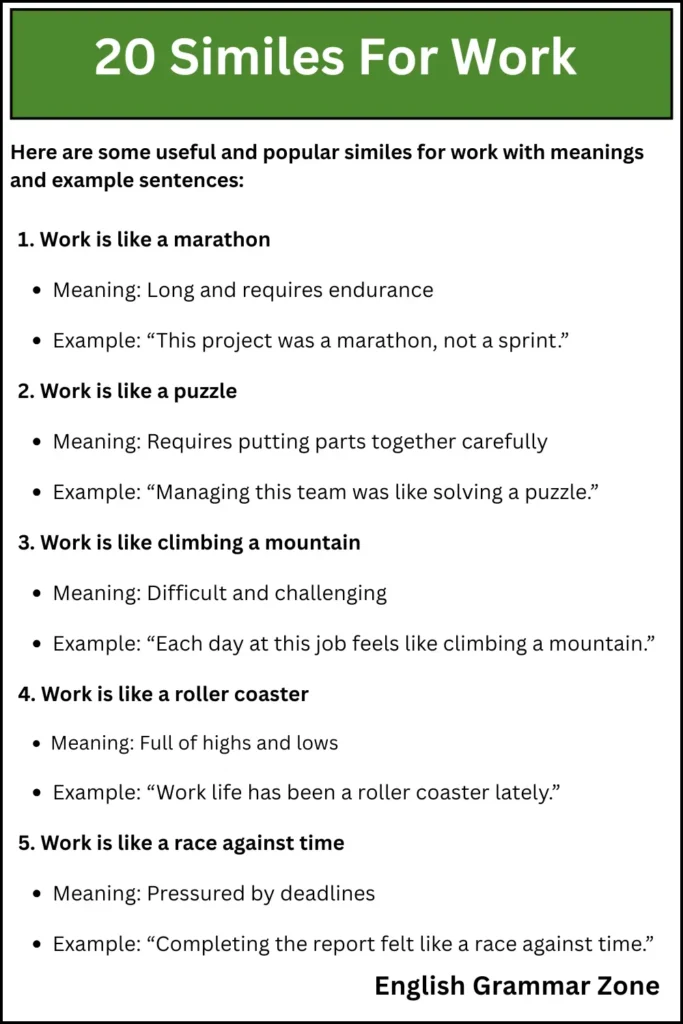Work is a big part of everyone’s life. Whether you’re a student, employee, or entrepreneur, similes for work help make your writing more vivid and relatable. Using similes can turn a simple description like “work is hard” into something more powerful and memorable.
This article shares a variety of similes for work to describe different aspects of working life — from challenges to achievements. You’ll find clear definitions, examples, and tips on how to use these similes effectively.
What Are Similes for Work?
Similes for work are comparisons that use “like” or “as” to describe work-related experiences. They help paint a clearer picture of what work feels like.
Definition:
A simile is a figure of speech that compares two different things to make a description more vivid and interesting.
Why Use Similes for Work?
To describe the nature of work more creatively
To help readers relate emotionally to your writing
To add emphasis and clarity to your ideas about work
Why Use Similes for Work in Your Writing?
Describing work with similes makes your writing stand out. Instead of saying, “work is tiring,” using a simile for work like “work is like climbing a mountain” gives a clear sense of the struggle and persistence involved.
Top 20 Similes for Work
Here are some useful and popular similes for work with meanings and example sentences:
1. Work is like a marathon
Meaning: Long and requires endurance
Example: “This project was a marathon, not a sprint.”
2. Work is like a puzzle
Meaning: Requires putting parts together carefully
Example: “Managing this team was like solving a puzzle.”
3. Work is like climbing a mountain
Meaning: Difficult and challenging
Example: “Each day at this job feels like climbing a mountain.”
4. Work is like a roller coaster
Meaning: Full of highs and lows
Example: “Work life has been a roller coaster lately.”
5. Work is like a race against time
Meaning: Pressured by deadlines
Example: “Completing the report felt like a race against time.”
6. Work is like a well-oiled machine
Meaning: Runs smoothly when organized
Example: “Our department runs like a well-oiled machine.”
7. Work is like digging a hole
Meaning: Hard and repetitive
Example: “Some tasks feel like digging a hole.”
8. Work is like a balancing act
Meaning: Juggling different tasks carefully
Example: “Balancing meetings and deadlines is a balancing act.”
9. Work is like planting a garden
Meaning: Needs patience and care
Example: “Growing client relations is like planting a garden.”
10. Work is like a tug-of-war
Meaning: Struggle between opposing forces
Example: “The negotiation was a tug-of-war.”
11. Work is like a river
Meaning: Continuous and sometimes changing
Example: “The workflow flows like a river.”
12. Work is like a furnace
Meaning: Intense and demanding
Example: “Deadlines made the office a furnace of stress.”
13. Work is like a treasure hunt
Meaning: Challenging but rewarding
Example: “Finding solutions is like a treasure hunt.”
14. Work is like clockwork
Meaning: Predictable and smooth
Example: “The project went like clockwork.”
15. Work is like a fire
Meaning: Needs constant attention
Example: “Keeping motivation is like tending a fire.”
16. Work is like a snowball
Meaning: Growing bigger over time
Example: “The workload became a snowball.”
17. Work is like a storm
Meaning: Intense and chaotic but temporary
Example: “Last week was like a storm of deadlines.”
18. Work is like walking a tightrope
Meaning: Requires focus and balance
Example: “Managing projects is like walking a tightrope.”
19. Work is like a chess game
Meaning: Strategic and thoughtful
Example: “Running a business is like a chess game.”
20. Work is like a sponge
Meaning: Absorbs your energy
Example: “This job feels like a sponge soaking up all my energy.”
How to Use Similes for Work Effectively
Choose similes that fit your tone and audience.
Avoid overused clichés; try fresh similes.
Use similes to highlight key points about work.
Explain similes briefly if needed for clarity.
Conclusion
Using similes for work enriches your writing by adding vivid imagery and clarity. These similes make descriptions of work environments and tasks more engaging and relatable. Whether for articles, speeches, or everyday communication, similes for work help capture the essence of the work experience in creative and memorable ways.
Try incorporating these similes for work into your writing to make your language more dynamic and impactful.


